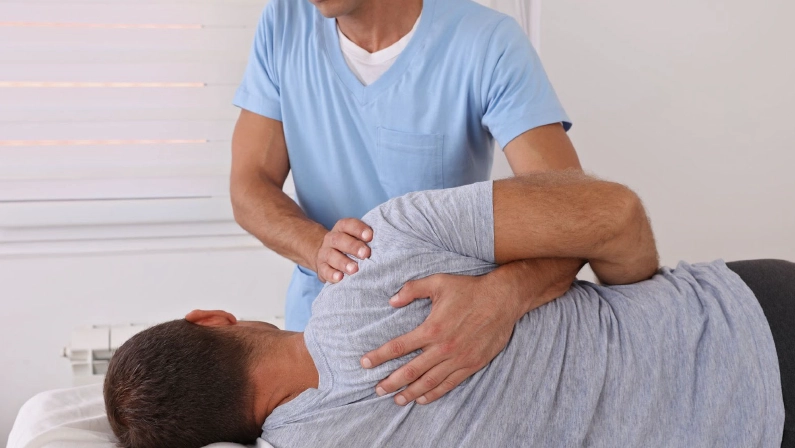Living with chronic pain can feel like an endless cycle of discomfort, limited mobility, and frustration. Whether it’s persistent back pain, joint stiffness, or musculoskeletal discomfort, finding lasting relief often seems elusive.
Osteopathy offers a natural, holistic approach to pain relief and mobility restoration. While conventional treatments often focus solely on symptom management, osteopathy targets the root cause of pain, supporting the body’s self-healing abilities. Those interested in professional treatments can explore the Osteopathy service page to learn more about available options.
This guide explores how osteopathy works, the science behind its effectiveness, and how it can help you regain movement, reduce pain, and improve your quality of life.
What Is Osteopathy and How Does It Work?
Osteopathy is a hands-on approach to healthcare that focuses on the musculoskeletal system—the framework of bones, muscles, and joints that keeps the body moving. Instead of treating symptoms alone, it works to identify and correct imbalances that lead to pain, stiffness, and limited mobility.
How Osteopathy Works to Support Natural Healing
The body functions as a connected system, meaning that tension, misalignment, or restricted movement in one area can lead to discomfort in another. When joints become stiff or muscles tighten, the body compensates, often resulting in pain or limited mobility over time.
Osteopaths use gentle manual techniques to restore balance, enhance circulation, and reduce pressure on nerves. By improving joint mobility, blood flow, and overall body mechanics, osteopathy helps ease chronic pain and supports long-term healing.
Osteopathy vs. Physiotherapy vs. Chiropractic Care
While osteopathy shares some similarities with other manual therapies, it takes a more holistic approach to treatment:
- Osteopathy focuses on the whole body, addressing joints, muscles, nerves, and circulation to promote self-healing.
- Physiotherapy uses exercise-based rehabilitation to rebuild strength and restore function, often after injury.
- Chiropractic care mainly targets the spine, using spinal adjustments to improve nerve function and reduce pain.
For those searching for how osteopathy works, this approach provides a gentle, non-invasive way to relieve chronic pain and restore mobility without relying on medication or surgery.
How Osteopathy Provides Chronic Pain Relief
Chronic pain often results from structural imbalances, restricted movement, or nerve compression. While some treatments only mask symptoms, chronic pain relief osteopathy addresses the root cause. By restoring mobility, reducing inflammation, and correcting posture, it supports long-term healing and better function.
Restoring Joint and Muscle Mobility
Stiff joints and tight muscles limit movement, leading to pain and discomfort. Osteopath Gold Coast specialists use gentle manipulations, stretching, and soft tissue techniques to loosen muscles, restore flexibility, and improve joint mobility.
Reducing Inflammation for Lasting Relief
Inflammation is a major contributor to chronic pain, especially in conditions like arthritis. Osteopathy enhances circulation and lymphatic drainage, helping the body reduce swelling and remove toxins that cause discomfort.
Soft tissue techniques like myofascial release improve blood flow, muscle function, and pain relief by reducing tension in the fascia—the connective tissue surrounding muscles. This method targets restricted areas, helping to release built-up stress.
According to the Mayo Clinic’s expert guide on myofascial release, this technique eases chronic pain by breaking up restrictions in soft tissues and restoring flexibility. It also reduces pressure on inflamed areas.
Correcting Postural Imbalances
Poor posture puts uneven stress on the spine, muscles, and joints, often resulting in chronic neck pain, back pain, and headaches. Osteopaths assess postural misalignments and use manual adjustments and corrective exercises to realign the body.
Relieving Nerve Compression and Sciatica
When nerves become compressed due to tight muscles, spinal misalignment, or disc issues, pain can radiate through the body, causing conditions like sciatica or carpal tunnel syndrome. Osteopathy reduces nerve pressure by improving spinal alignment, relaxing surrounding muscles, and enhancing circulation.
Enhancing the Body’s Natural Healing Response
Osteopathy doesn’t just relieve pain—it stimulates the body’s self-healing abilities by improving nervous system function, blood circulation, and muscle recovery. This holistic approach ensures long-term relief rather than temporary fixes.
Why It Matters: Osteopath Gold Coast treatments go beyond just managing pain. By restoring body balance and function, they help prevent future issues, allowing patients to move freely and pain-free.
With a personalized approach to chronic pain relief, osteopathy provides lasting results that help patients regain comfort and mobility in everyday life.
Osteopathy vs. Other Pain Relief Methods
| Treatment Method | Approach | Effectiveness for Chronic Pain | Side Effects |
| Osteopathy | Hands-on manual therapy | Addresses root causes, improves mobility | Minimal to none. Learn more about osteopathy safety and potential side effects from the NHS. |
| Chiropractic | Focuses on spinal adjustments | Effective but limited to the spine | Possible soreness |
| Physiotherapy | Exercise-based rehabilitation | Good for injury recovery | Requires consistency |
| Pain Medication | Suppresses symptoms | Temporary relief only | Possible dependency & side effects |
Who Can Benefit from Osteopathy?
Pain and stiffness can creep into daily life, limiting movement and making even simple tasks uncomfortable. Osteopathy takes a hands-on approach to address these issues, focusing on the body’s structure and function to improve mobility, relieve tension, and restore natural balance.
Osteopath Gold Coast Specialists Treat:
Chronic Back & Neck Pain
Slouching over screens, long hours at a desk, or old injuries can lead to persistent back and neck pain. Osteopathy eases muscle tension, improves posture, and restores mobility, helping you move with greater comfort and ease.
Arthritis & Joint Stiffness
Stiff, achy joints don’t have to be a daily struggle. Osteopathy supports joint mobility and circulation, helping to reduce inflammation and maintain flexibility—without relying on medication.
Sciatica & Nerve Pain
Sharp, shooting pain down the legs? Numbness or tingling in your arms? These symptoms often signal nerve compression. Osteopathic treatment helps free trapped nerves, realign the spine, and relax tight muscles to ease discomfort and restore function.
Sports Injuries & Repetitive Strain Injuries (RSI)
From muscle strains to overuse injuries, athletes and active individuals put their bodies through a lot. Osteopathy accelerates recovery, reduces inflammation, and improves movement patterns to help prevent future injuries.
Headaches & Migraines Linked to Posture
If tension headaches or migraines are disrupting your day, poor posture and muscle tightness may be to blame. Osteopathy relieves built-up tension in the neck and shoulders, promotes better circulation, and helps reduce headache severity and frequency.
What to Expect in an Osteopathy Session
An osteopathy session is designed to identify the root cause of pain and provide gentle, hands-on treatment to restore movement and reduce discomfort.
Initial Consultation
The session begins with a thorough assessment, where the osteopath evaluates:
✔ Areas of pain and stiffness
✔ Posture and movement patterns
✔ Joint and muscle function
This helps create a personalized treatment plan tailored to your needs.
Treatment Techniques
Osteopaths use a range of manual therapies to relieve pain and improve mobility, including:
✔ Joint Mobilization – Increases flexibility and reduces stiffness
✔ Soft Tissue Therapy – Relieves muscle tension and improves circulation
✔ Myofascial Release – Eases tightness in connective tissues
Most treatments are gentle and non-invasive, with minimal discomfort.
Post-Treatment Advice
To enhance long-term results, the osteopath may recommend:
✔ Stretching & Strengthening Exercises
✔ Postural Adjustments
✔ Lifestyle Tips for Pain Prevention
With consistent care and small adjustments, chronic pain relief osteopathy can help you move more freely and live without discomfort.
How to Choose the Best Osteopath Gold Coast Clinic
The right osteopath can make a world of difference in your recovery and overall well-being. With so many options available, knowing what to look for ensures you receive expert care tailored to your needs.
1. Verify Qualifications and Registration
A reputable osteopath should be fully qualified and registered with the Osteopathy Board of Australia (OBA). This guarantees they meet strict professional standards and adhere to safe, evidence-based practices.
2. Prioritize Experience in Chronic Pain Treatment
If you’re dealing with long-term pain, choose a clinic that specializes in managing conditions like back pain, arthritis, sciatica, and postural issues. Experienced osteopaths focus on treating the root cause rather than just alleviating symptoms.
3. Check Patient Reviews and Testimonials
Patient feedback provides insight into a clinic’s quality of care. Look for reviews that highlight:
✔ Effective pain relief and improved mobility
✔ Professional, knowledgeable, and compassionate osteopaths
✔ A welcoming and comfortable clinic environment
Selecting a trusted osteopath on the Gold Coast ensures you receive personalized care that promotes lasting relief and better movement.
Find Pain Relief at an Osteopath Gold Coast Clinic

Living with chronic pain makes everyday life harder than it should be. Back pain, arthritis, sciatica, or an old sports injury can limit movement and cause ongoing discomfort. Osteopathy offers a hands-on approach that helps restore mobility and ease tension, focusing on long-term relief rather than temporary fixes.
With hands-on techniques designed to improve flexibility, reduce tension, and support long-term recovery, osteopathy provides a lasting solution for those looking to move comfortably again. If pain has been slowing you down, now is the time to take the first step toward relief.



